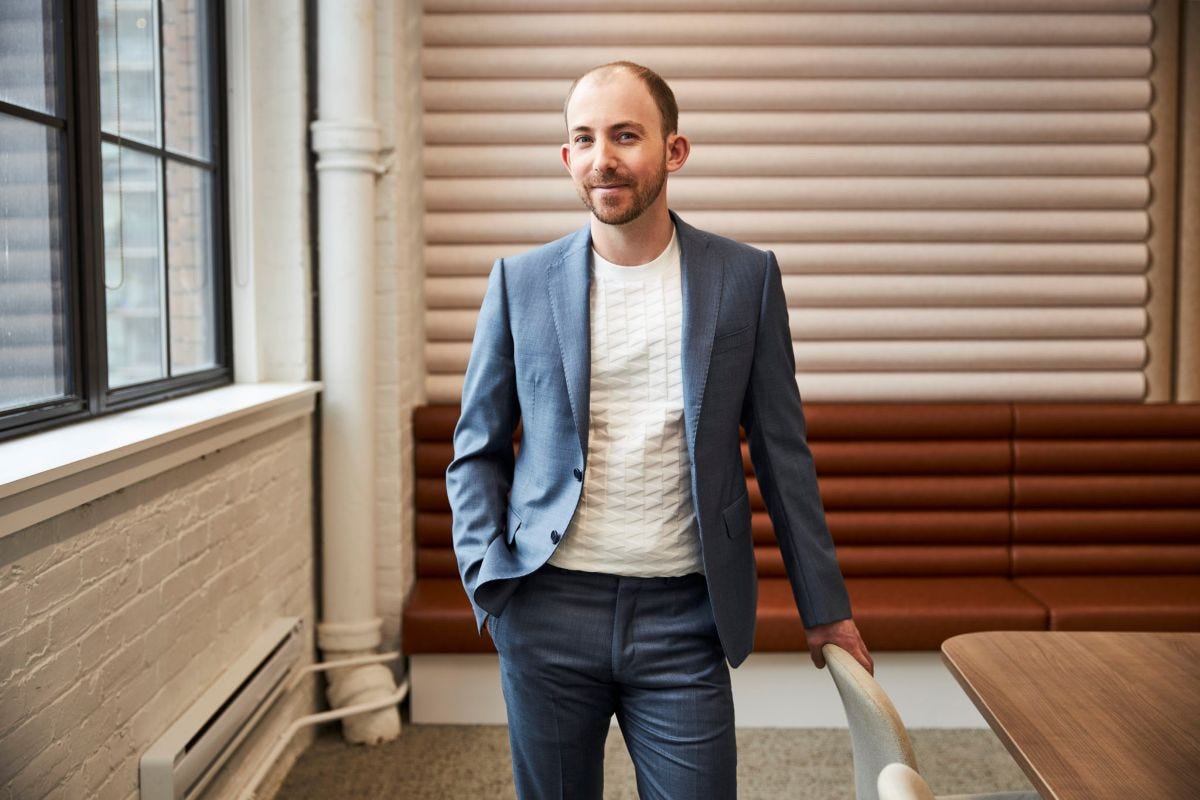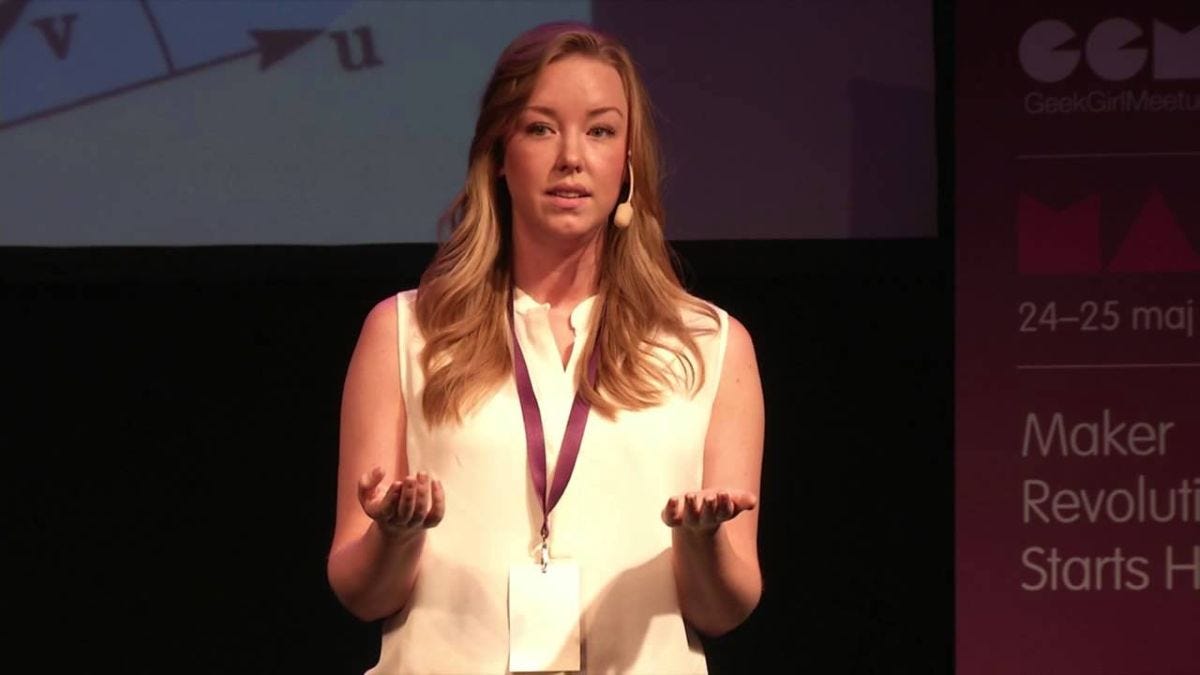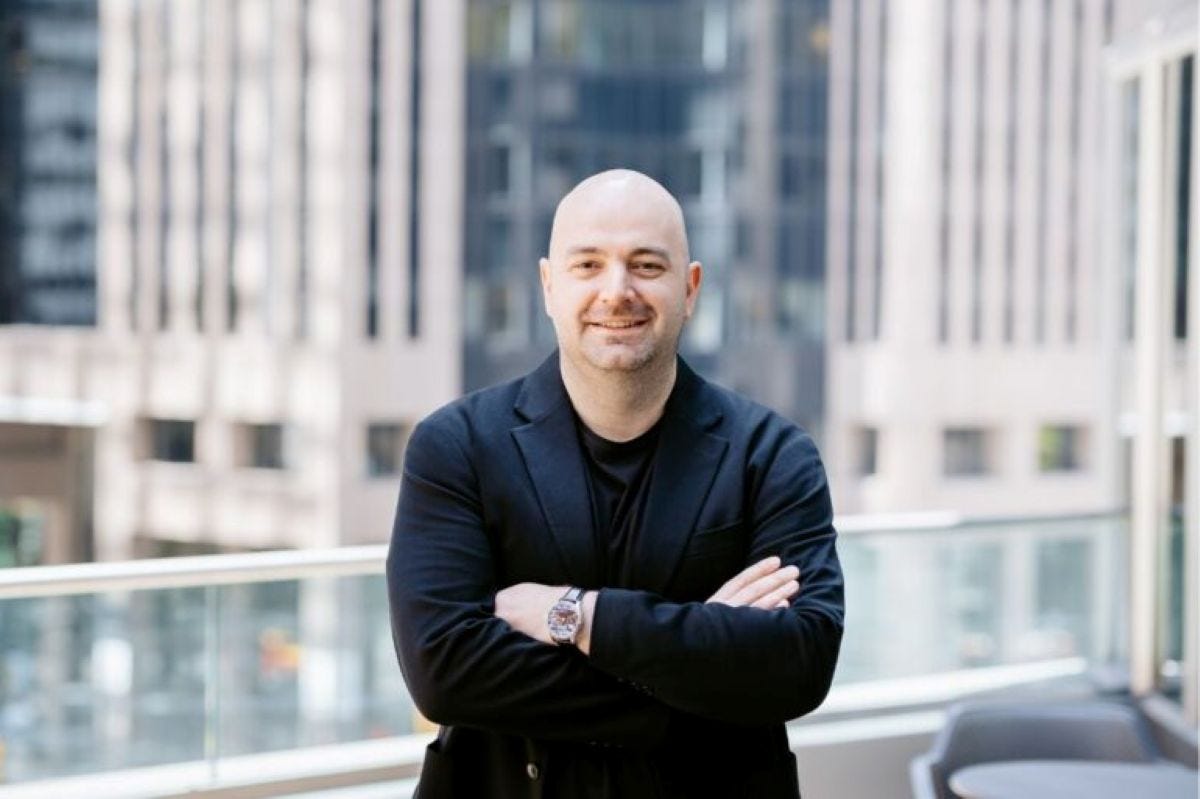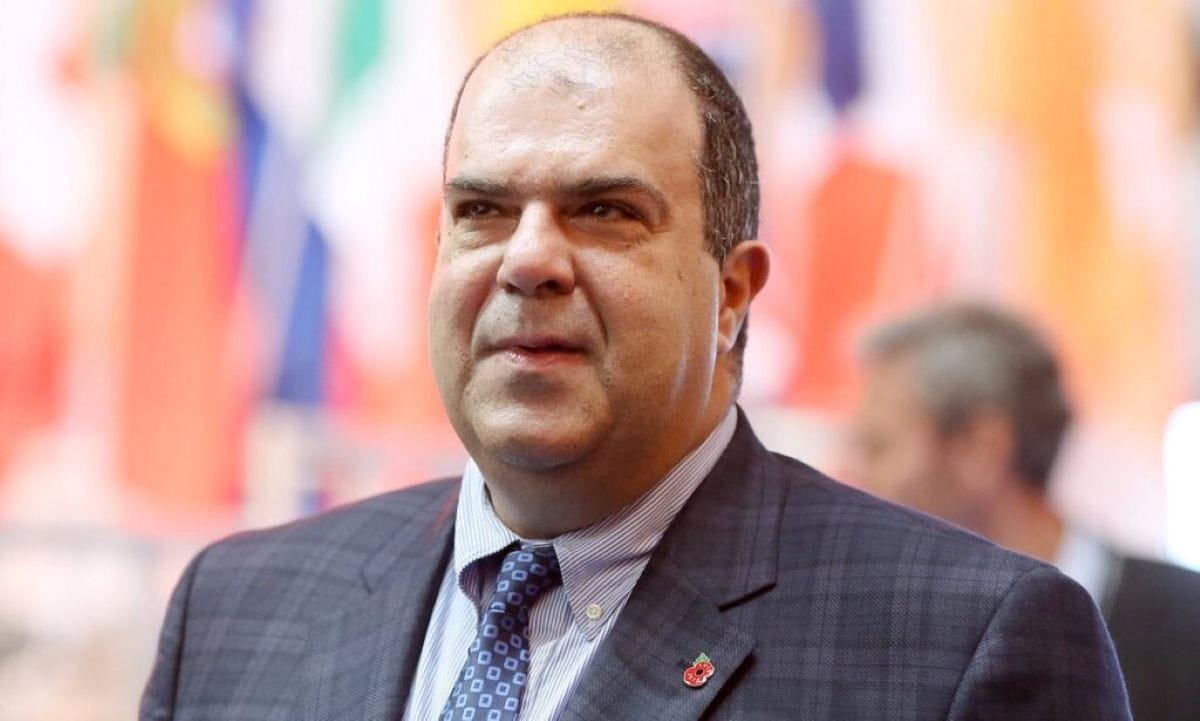Klarnauts Feel They Are the Biggest Losers in Klarna’s $1.37B IPO 🇸🇪
We're also covering Trump's tip tax break fintech impact 🇺🇸, Canadian banks uniting for stablecoin sovereignty play 🇨🇦, Kaspi vs Revolut Turkey showdown 🇹🇷 & EasyJet founder's crypto pivot 🇬🇧
🇸🇪 Klarnauts Feel They Are the Biggest Losers in Klarna’s $1.37B IPO
Swedish buy-now-pay-later giant Klarna's rank-and-file staff feel the company's New York IPO did not work out for them. Employees, known internally as "Klarnauts", were handed restricted stock units (RSU) that triggered massive tax bills in Sweden when the company hit its $45 billion peak valuation. Still, they couldn't actually sell their shares to pay those taxes, a former staffer reveals.
Former Klarna engineer Kim Öberg (pictured above) criticised the company’s compulsory RSU scheme, which forced staff to take part of their raises in stock units rather than cash. “It was sold as ‘democratising’ ownership, but it was all smoke and mirrors,” she wrote in a LinkedIn post. Employees were told RSUs would make them owners, but instead, Klarna cut payroll costs while limiting salaries and retirement contributions. “RSUs 👏 Are 👏 Not 👏 Cash. They’re taxable monopoly money and as such should never be forced upon employees,” said Öberg in another LinkedIn post following the IPO.
Öberg explained further that the tax rules made matters worse. In Sweden, RSUs are taxed as income the moment they vest, even though they can’t be sold until later. Many Klarnauts were taxed when Klarna’s private valuation hit $45B, handing over much of their paychecks to cover tax bills on shares they couldn’t cash in.
Now, with the IPO pricing at roughly a third of that level and a 4:1 conversion ratio that slashed the number of shares with some employees have ended up paying more in taxes than their holdings are worth.
By contrast, early backers and executives are reaping huge gains. Co-founder Victor Jacobsson’s stake is worth $1.1B, while CEO Sebastian Siemiatkowski holds $920m worth and did not sell any shares. Chief Product Officer David Fock’s stake is valued at $21.6m, even after selling 40%. In total, over 40 current and former employees are set to become millionaires. Major investors like Sequoia Capital and Heartland A/S also pocketed hundreds of millions through share sales.
Klarna’s recent $1.37B New York IPO sent its shares up 30% to $52 and valued the company at $19.65B.
Sources: Global Fintech Insider, Sifted & Reuters
🇺🇸 Trump’s “No Tax On Tips” Law May Open Door For More Tip-Based Fintechs

Making tips tax-free in the US might trigger a wave of new tipping features. For creators hitting marginal tax rates above 50%, President Trump's "no tax on tips" policy could be game-changing. Workers can deduct up to $25,000 in qualified tips annually from 2025 to 2028. According to Rex Salisbury (pictured above), founder of fintech VC firm Cambrian, this could open the door to fintech relying more on tipping as a monetization strategy. “Tips have seen fairly wide adoption in earned wage access and instant payouts. Now they are also tax free…”, he wrote on LinkedIn.
Several fintechs already lean on tipping models: California's Earnin uses tips instead of interest for early wage access, Cash App enables peer-to-peer and creator tipping, while Montreal-based Zeffy has processed $800 million in donations for 50,000 nonprofits, saving them $40 million in fees through optional contributions.
Some investors remain cautious. Ron Bauer, founder of London-based venture capital firm Theseus Capital, said while the tax edge is appealing, fundamentals matter more. “Tax advantage is nice, but cash flow predictability still drives most business decisions... especially for early-stage companies,” he said in a comment on the same LinkedIn thread. The US Treasury’s preliminary list of 68 tipped occupations includes bartenders and estheticians but excludes “specified service trades” such as financial services, healthcare, and performing arts. The final list is due October 2.
Sources: Global Fintech Insider & Hollywood Reporter
🇨🇦 Major Canadian Banks Team Up With Wealthsimple & Shopify to Launch Canadian-Pegged Stablecoin
Canadian major banks and fintechs unite to launch the country's first regulated Canadian dollar-pegged stablecoin. The coalition includes major financial institutions ATB Financial and National Bank, alongside Canada’s largest digital wealth manager Wealthsimple, crypto exchange Shakepay, e-commerce giant Shopify, and investment firm Purpose Unlimited. Canadian-based financial services company Tetra Digital Group, which already safeguards over $2.5 billion CAD in digital assets through its subsidiary Tetra Trust, plans to launch the stablecoin in early 2026 pending regulatory approval.
Tetra has raised $10 million CAD ($7.2 million) from this diverse group to build the digital token. About 30% of the funds will go directly into the stablecoin project, with the rest used to scale Tetra Unity, the firm's treasury management software.
Tetra Digital Group CEO Didier Lavallee (pictured above) framed the project as both commercial and patriotic. "Everybody's very interested in the stablecoin and Canadian stablecoin problem. There is a sense of sovereignty here," he told BetaKit. Wealthsimple's Chief Legal Officer, Blair Wiley, stated that it's "rare for such a broad group of high-quality companies to work together on a project like this."
Meanwhile, Toronto-based Stablecorp is also pursuing a Canadian-pegged stablecoin through a prospectus-based model, setting up a regulatory and market test between two approaches.
Source: Betakit
🇹🇷 Kazakhstan Super App Kaspi Takes On Revolut In Battle For Turkey's 85 Million People
Ready-made super-app Kazakhstan’s Kaspi and London-based neobank Revolut are set to collide in Turkey. Both are betting on very different paths to win over the country’s 85 million population. “Kaspi is entering with a ready-made super-app foundation. Revolut’s playbook is still to be revealed. The head-to-head will shape how digital banking evolves here,” said co-founder of fintech advisory firm Outrun, Elbruz Yılmaz (pictured above), in a LinkedIn post comparing the two approaches.
Kaspi has quickly secured both scale and infrastructure. In January, it bought 65% of e-Turkish e-commerce giant Hepsiburada for $1.1 billion, gaining access to tens of millions of Turkish consumers. Two months later, it agreed to acquire Rabobank A.Ş., giving it a local banking licence. “Imagine the disruption when you mix a full banking license with one of the biggest eCommerce platforms in the country. That’s a Super App play from day one,” said digital banking advisor David Jimenez Maireles in a post in the same LinkedIn thread.
Revolut’s entry is less defined. Valued at around $75 billion, it has made key hires, including former Hepsiburada executive Erkin Aydın, but has not revealed whether it will build, partner, or acquire locally. Revolut brings 40 million global users, capital, and a proven challenger model, but unlike Kaspi, it lacks built-in distribution in Türkiye. Kaspi’s serves 75% of Kazakhstan’s population, processes 85% of cashless payments, and generated nearly $5 billion in revenue with $2 billion in profit last year.
Both firms will face strong local rivals. Papara, with over 20 million users, offers payments, cards and remittances; Paycell, from Turkcell, ties finance to mobile services; and Spain’s banking giant BBVA is expanding in Türkiye through Garanti BBVA and its digital arm.
Source: Global Fintech Insider
🇬🇧 From Budget Flights To Bitcoin, EasyJet Founder Takes Low-Cost Model Into Crypto
Billionaire entrepreneur Stelios Haji-Ioannou (pictured above) wants to do to crypto what he did to airlines. The EasyJet founder is launching EasyBitcoin, a crypto trading platform that applies his signature low-cost model to an industry dominated by fee-heavy giants like Binance. The app is already live on iOS this month, with Android coming soon. “I’m only doing it because the Trump second election has made it completely mainstream,” he told Bloomberg, referring to the GENIUS Act.
It’s the latest addition to Haji-Ioannou’s “easy” empire, which spans gyms, hotels, storage, coffee, and even pet travel. The model relies on licensing the brand in exchange for royalties. EasyJet remains its crown jewel, with the Haji-Ioannou family still holding a 15% stake nearly three decades after its founding.
Source: Bloomberg
🇬🇧 Lloyds Snaps Up Apple Pay Challenger Curve In $162m Fire Sale

UK’s High Street banking giant Lloyds Banking Group is set to acquire London-based digital wallet startup Curve for £120m ($162 million) in a fire sale, Sky News reports.
The price marks a dramatic fall for the fintech that positions itself as an Apple Pay competitor and was once tipped for a $50–60B IPO. Since its founding in 2016, Curve has raised more than £200m from backers including Britannia, IDC Ventures, Cercano Management (linked to Microsoft co-founder Paul Allen's estate), and Outward VC.
Sky News also report that several investors are reportedly livid over the valuation and how proceeds will be distributed, with tensions escalating to the point that at least one has called for the removal of Curve chairman Stanley Fink. CEO Shachar Bialick (pictured above) reportedly acknowledged the disappointing price in a letter, warning that Curve could run out of cash this year without a deal.
For Lloyds, the acquisition represents a strategic push into digital payments as regulators pressure Apple and Google to open app stores to other payment systems.
Source: Sky News
🇨🇦 Canada’s Largest Fintech Wealthsimple Hit By Data Breach Affecting 30,000 Accounts

Canada's largest digital wealth manager, Wealthsimple, suffered a data breach that exposed sensitive information to a small group of its customers. Data accessed included social insurance numbers, account numbers, dates of birth and government IDs. The incident, detected on August 30 and contained within hours, was traced to a compromised software package from a trusted third-party vendor. The company confirmed no passwords or funds were compromised and said it has "already made improvements to prevent this type of issue from happening again."
"We sincerely apologise for any frustration this incident caused our clients," said Justin Grudzien, Wealthsimple's chief information security officer, in a statement to The Globe and Mail. He stressed there is "no evidence" the data has been misused, and confirmed Wealthsimple itself was not targeted.
About 30,000 affected customers, less than 1% of the company's three million users, will receive two years of free credit and dark-web monitoring, as well as identity theft protection and insurance. Wealthsimple, headed by CEO Michael Katchen (pictured above), is Canada's largest privately held fintech with a $4B valuation.
Source: The Globe and Mail
Upcoming Fintech Events
🇨🇦 Fintech Sandbox Innovation Forum will be held in Boston on September 16–17, 2025 ($495), with speakers such as David Jegen, Managing Partner, F-Prime & Co-Founder, Fintech Sandbox, Karan Kashyap, CEO & Co-Founder at Posh, and Mike Massaro, CEO at Flywire.
🚨 GFI Exclusive Offer: Enjoy a 20% discount on tickets using the BFTW25-NEW-FRONTIER promo code!
🇨🇦 The Customer Experience for Financial Services Summit will be held in Toronto on September 18–19, 2025 ($995), with speakers such as Amit Mondal, VP & Head of Digital Analytics & Experimentation at Amex & Angela Crapsi, AVP of Operations at Flexiti/Questrade.
🇨🇦 Canada Fintech Forum will be held in Montreal on September 22–23, 2025 (CA$460–CA$1,199), with speakers such as Shelby Austin, Co-Founder and CEO at Arteria AI, Hamed H. Arbabi, Founder and CEO at VoPay, and Daniel Eberhard, Founder and CEO at KOHO.
🚨 GFI Exclusive Offer: Enjoy a 15% discount on tickets using the GFI15 promo code!
🇬🇧 Buy AND Build: The Future of Capital Markets Technology will be held in London on October 2, 2025 (£360), with speakers such as David Marcos, CIO & Head of AI, IO Capital Group, Richard Bell, Head of Engineering at CoinShares, and Jon Butler, Co-Founder & CEO at Velox.
🚨 GFI Exclusive Offer: Enjoy a 15% discount on tickets using the GFI15 promo code!
🇩🇪 Sibos will take place in Frankfurt from September 29 to October 2 ($1,180.90 for fintechs), with speakers such as Victoria Cleland, Director of Payments at the Bank of England & Sophie Gilder, Managing Director, Blockchain & Digital Assets at Commonwealth Bank.
🇸🇬 TOKEN2049 Singapore will be held in Singapore on October 1–2, 2025 ($499–$4,999), with speakers such as Vlad Tenev (Chairman and CEO, Robinhood), Bryan Johnson (Founder and CEO, Blueprint / Don’t Die), and Donald Trump Jr. (Co-Founder, World Liberty Financial).
🇬🇧 Buy AND Build: The Future of Capital Markets Technology will be held in London on October 2, 2025 (£360), with speakers such as Jon Butler (Co-Founder & CEO, Velox), Dan Schleifer (President & Co-Founder, Interop.io), and Steve Grob (Founder, Vision57).
🚨 GFI Exclusive Offer: Enjoy a 15% discount on tickets using the GFI15 promo code!
Who Am I?
Hi, my name is Julien Brault.
From 2017 to 2024, I was the CEO of Hardbacon, a fintech I co-founded, which reached 400,000 unique visitors at its peak.
A Google update ultimately sealed the company’s fate, and I started this newsletter to keep myself busy in the aftermath.
Why share this?
Because my goal is to use my experience as an economic journalist, fintech entrepreneur and product manager to present the most essential fintech news from around the world through the eyes of an insider.
If you like what I do, feel free to share this newsletter and follow me on LinkedIn, X, Reddit, YouTube & TikTok.
If you are raising funds for your fintech and would like to be featured in Global Fintech Insider for free, fill out this form.
P.S : Once you refer a new subscriber to the newsletter using your unique share link, you'll receive a personalised social media shout-out from me to promote your work or professional profile. Just write to me at jrbrault@icloud.com once your referral is confirmed on our leaderboard and include your social media account(s) URL(s) and who you are.







